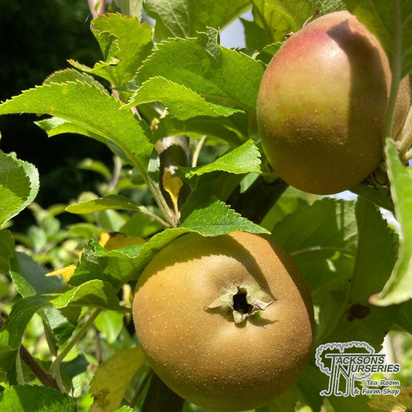A long established deciduous variety which bears small, very well flavoured apples, pale green to pale yellow in colour, with a hint of pale red. Russets are highly regarded for their rough skins and sweet flavour. The blossom has very good frost tolerance. Its looks may not be appealing as those of other apples but its wonderful flavour makes for one of the best dessert apples you can buy.
Suitable for Northern, colder, higher rainfall areas, it will crop best in a sunny location
Although partially self-fertile, it will benefit from having a nearby pollinator. Suitable pollinators are:
Apple domestica 'James Grieve'
Apple domestica 'Spartan'
Apple domestica 'Katy'
Apple domestica 'Charles Ross'
Apple domestica 'Cox's Orange Pippin'
Apple domestica 'Grenadier'
Root Stock: MM106
Pollination group A. Part self-fertile.
Note: 2 year+ stock with established heads not 1 year maidens.
* FAN-SHAPED TREES ARE EXCLUSIVE TO THE GARDEN CENTRE ONLY - FOR COLLECTION / LOCAL DELIVERY
Buying Fruit Trees/Bushes from Jacksons Nurseries
Our trees might be Freshly Potted and the root system may not be fully established, and loose soil may occur when unpacking.
Unlike many garden centres, supermarkets and some nurseries here at Jacksons Nurseries we sell the majority of our stock all year round. Our stock is for the most part grown outdoors making it far hardier than those grown under glass and/or only sold ‘In Season’.
Here at Jacksons Nurseries we would favour a hardy outdoor grown plant every time. They are far less likely to suffer from the shock of being planted in colder conditions and they will begin to establish more rapidly the following spring. This can mean that they don’t look like a ‘picture perfect’ plant when purchased out of season but with the correct care and a little time you’ll have a wonderful plant to enjoy for many years to come.
No posts found




